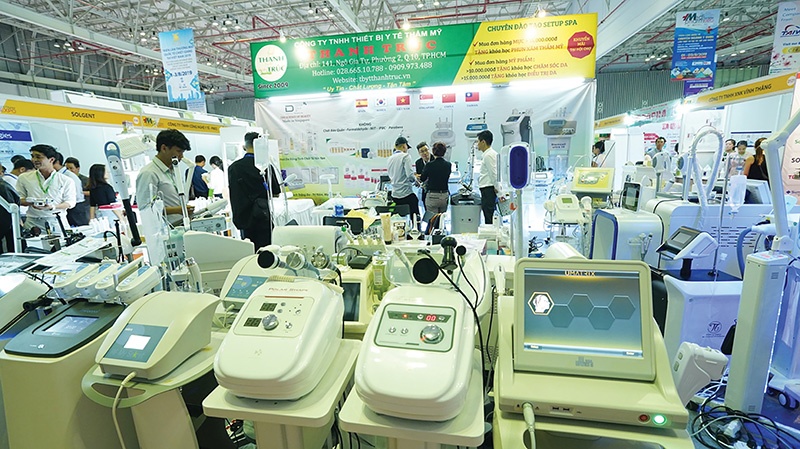Rules set to benefit medical suppliers
 |
| Multinational corporations have already built strong growth in Vietnam through medical devices and other innovations, photo Le Toan |
The Vietnamese government on November 8 issued Decree No.98/2021/ND-CP on the management of medical devices, which officially adds these to the list of goods subject to price declaration and allows state agencies to ask businesses to explain price components when necessary.
Accordingly, marketing authorisation will be changed from pre-check to post-check, while administrative reform will be intensified and measures on price management will be added to facilitate price declaration. The process includes prime cost of imported goods or prime cost of production, management cost, training cost, estimated profit, and final selling price, among others.
For Class C and D devices, the time for granting marketing authorisation will be reduced from 60 to 10 working days if these devices are licensed for circulation in the US, Australia, Japan, and Canada.
Medical devices in Vietnam are classified in terms of risks in accordance with the ASEAN Medical Device Directive, which lists four classes from low risk (Class A) to high risk (Class D).
The new decree also removes some conditions and procedures in administrative processes, as well as simplifies some procedures for businesses. For example, it simplifies the requirements on manufacturing, sales, and consultancy towards removing direct submission of paperwork to state agencies and allows businesses to make online registrations.
In addition, the validity of circulation numbers will be revised towards allowing an unlimited time, instead of five years as it did in the past. Thus, medical equipment enterprises will not have to carry out procedures for an extension. They must, however, update relevant documents when they make changes in circulation.
Also importantly, Decree 98 supplements measures for medical device price management to solve the existing problems related to price variation in winning tenders among health facilities, and when there is no reference price for the building plans on the selection of contractors.
Coming into effect from January 1, the new rules are aimed to increase transparency in the local market and prevent wrongdoing. Vietnam has seen some serious issues in medical device purchases, with the latest scandal being related to alleged illegal profiteering in medical equipment purchases at the state-run Bach Mai Hospital.
Multinational corporations, including brands like Abbott Diagnostics, B. Braun, Bayer, DKSH, GE Healthcare, and Roche Diagnostics are expected to benefit from the new rules. They are among the 26 global group members of EuroCham’s Medical Devices and Diagnostics Sector Committee (MDDSC) responsible for most of the $2 billion market.
After more than 25 years, Abbott has built stable business growth. The company has broughts to Vietnam some innovations in nutrition, medicines, diagnostics, and medical devices.
Likewise, B. Braun is said to be working on its expansion in Vietnam, with the relocation of its Hanoi factory being among its main focuses. B. Braun has some manufacturing sites for medical devices in the country, with 20 per cent of total production assigned for its domestic consumption.
The company is working in exchange with hospitals to directly deliver equipment to them and hopes that these processes will be more convenient once consistent policies are in place.
According to the MDDSC, Vietnam’s medical devices and diagnostics market has had double-digit annual growth in recent times, with 90 per cent made up of imports, which stimulated companies to better serve the market through investments in a solid local network of partners. This has involved the setup of representative offices and, very often, the creation of local Vietnamese branches employing and training highly qualified local experts.
With the EU-Vietnam Free Trade Agreement in force over the past year, further improvements of regulatory standards, information exchange on customs requirements, and investments in the modernisation of customs procedures have come. It is forecast that the local market will become even more bustling as more multinationals are expanding to and in the market.
What the stars mean:
★ Poor ★ ★ Promising ★★★ Good ★★★★ Very good ★★★★★ Exceptional
Latest News
More News
- State corporations poised to drive 2026 growth (February 03, 2026 | 13:58)
- Why high-tech talent will define Vietnam’s growth (February 02, 2026 | 10:47)
- FMCG resilience amid varying storms (February 02, 2026 | 10:00)
- Customs reforms strengthen business confidence, support trade growth (February 01, 2026 | 08:20)
- Vietnam and US to launch sixth trade negotiation round (January 30, 2026 | 15:19)
- Digital publishing emerges as key growth driver in Vietnam (January 30, 2026 | 10:59)
- EVN signs key contract for Tri An hydropower expansion (January 30, 2026 | 10:57)
- Vietnam to lead trade growth in ASEAN (January 29, 2026 | 15:08)
- Carlsberg Vietnam delivers Lunar New Year support in central region (January 28, 2026 | 17:19)
- TikTok penalised $35,000 in Vietnam for consumer protection violations (January 28, 2026 | 17:15)

 Tag:
Tag:














 Mobile Version
Mobile Version